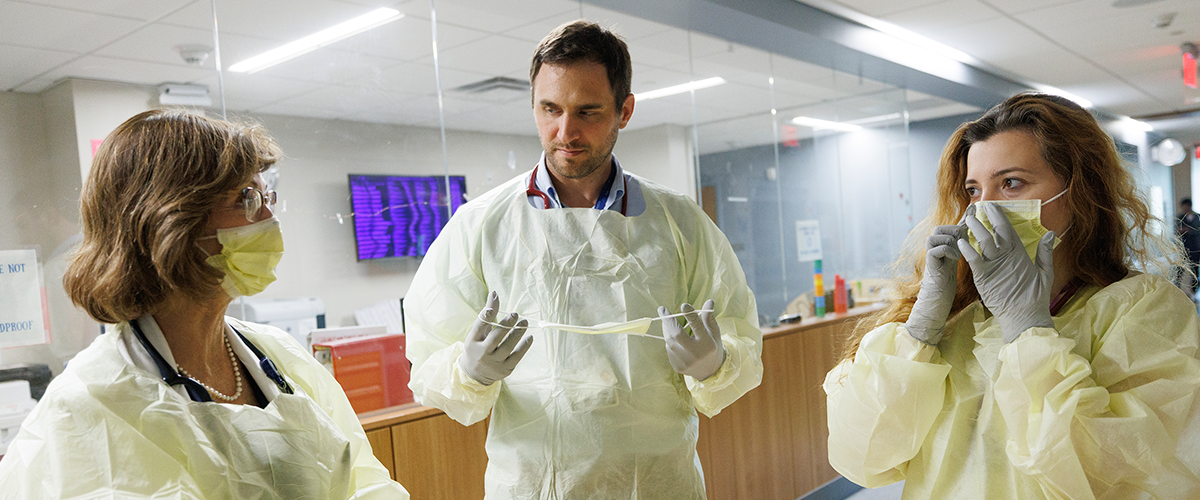
Our fellowship program provides dedicated training in antimicrobial stewardship and infection control by national experts in these disciplines.
The medical director of Pediatric Antimicrobial Stewardship, Ganga Moorthy, MD, MScGH, and associate director, Michael Smith, MD, MS, and the medical director of Pediatric Infection Control, Ibukun Akinboyo, MD, and associate medical director, Melissa Campbell, MD, are all faculty members in the Division of Pediatric ID.
Antimicrobial Stewardship and Infection Control Training Block
In the first year, the fellowship curriculum includes a two-week block with formal antimicrobial stewardship and infection prevention and control training.
During this block, fellows accompany Dr. Moorthy and an infectious diseases pharmacist on pediatric antimicrobial stewardship rounds. The primary focus of these rounds is prospective audit with feedback--the team reviews the charts of all hospitalized children who have been receiving antibiotics for > 48 hours and, as appropriate, offers guidance for antimicrobial therapy. Recommendations arising from stewardship rounds are conveyed to the clinical teams using an in-person “handshake stewardship” strategy, which facilitates in-depth discussions of individual cases and enables education of pediatric trainees and other providers.
Specific training in hospital epidemiology and infection prevention is provided by Drs. Akinboyo and Campbell and via attendance at the Duke University Hospital Infection Prevention and Hospital Epidemiology (IPHE) team meetings.
About IPHE
The IPHE team is staffed by two adult hospital epidemiologists, two pediatric hospital epidemiologists, a nurse clinical operations director, six infection preventionists, a public health epidemiologist who serves as liaison to the state health department, a full-time hand hygiene auditor, and a data analyst. The IPHE team performs a number of activities including surveillance for healthcare-associated infections and antibiotic-resistant organisms. In addition, this team performs other functions including communicable disease reporting, oversight of sterilization and disinfection activities, and construction risk assessments. Attendance of IPHE team meetings provides fellows with a broad understanding of the diversity of issues for which infection control specialists offer expertise in the hospital setting.
Additional Opportunities
The Duke Center for Antimicrobial Stewardship and Infection Prevention (DCASIP) provides extensive research and educational opportunities for fellows who desire additional focused training in these areas. Researchers from this center have published more than 100 papers and receive funding from federal grants and contracts including the CDC’s Prevention Epicenters and Safe Healthcare, Epidemiology, and Prevention Research Development (SHEPheRD) Programs.
The Duke Infection Control Outreach Network (DICON) provides non-academic health facilities with access to infection control experts, sophisticated data analysis tools, and infection control educational initiatives aimed at improving patient safety and the safety of the work environment. DICON is currently supporting nearly 50 community hospitals in 6 states in the Southeastern US, and has educational agreements with hospitals across the nation. The Duke Antimicrobial Stewardship Outreach Network (DASON) is a sister program to DICON that aims to promote judicious use of antibiotics in community hospitals throughout the US. Several faculty members in the Division of Pediatric ID are active in DCASIP, DICON, and DASON, providing fellows with numerous opportunities for research resulting from local and regional antimicrobial stewardship and infection control initiatives. Multi-center consortiums like DICON and DASON do not exist at other pediatric hospitals and provide our fellows with unparalleled opportunities for pediatric antimicrobial stewardship and infection control research.